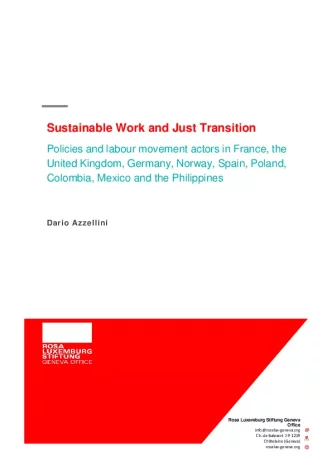Sustainable Work and Just Transition
Policies and labour movement actorsin France, the United Kingdom, Germany, Norway, Spain, Poland, Colombia, Mexico and the Philippines
“The opposition from vested interests can be overcome by a robust climate movement that leverages the power of the workers and the poor, and merges it with advocacy against social inequality. This is a key challenge for climate action in the Philippines and arguably elsewhere.” (Velasco 2022)
The aim of this study is to investigate and provide an overview of the policies and discourses regarding work in and for a social and ecological transition in six European countries (France, the United Kingdom, Germany, Norway, Spain and Poland), Colombia, Mexico and the Philippines. The perspective taken is that of sustainable work and just transition. Although sustainable work is part of the SDG signed by all countries in the UN in 2015, the concept has not found its way into national policy papers or programs. Almost no indicators and instruments supporting a more comprehensive social and ecological perspective on sustainable work, uniform criteria and parameters or a common terminology have been developed. This raises some methodological problems. However, due to the diverging contexts and circumstances, it was never the intention to produce a comparative study. There is a scientific consensus on the need to keep the global temperature increase below 1.5 degrees Celsius.
There is no room to negotiate with nature. It is obvious that no government is doing enough. The targets set are too low and the measures enacted are still not sufficient to meet them. There is no way around, that most societies have to consume fewer natural resources and energy, and produce less waste. Government documents often underline the need of a change in the prevailing patterns of consumption and production. But they avoid talking about work, the sense of work and about unpaid work. Work in the socio-ecological transition is usually approached as “green jobs” in a “green economy.” Both do not question the capitalist mode of production and are based on the idea of “green growth.” The quality of work does not play a role here, beyond statements of good will. As seen in the Global North and Global South, “green jobs” are largely low skilled, the majority are precarious and poorly paid.

